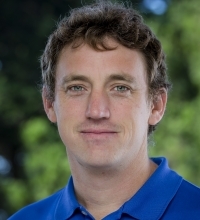Luke Gardner, PhD, is a California Sea Grant Extension Specialist based at the Moss Landing Marine Laboratories. Gardner is a biologist whose work focuses on leading and supporting research, extension activities, and education in the field of aquaculture. His work explores how aquaculture intersects with coastal California’s environment, economy, and citizens, and supports the development of sustainable aquaculture activities while balancing the economic, environmental and social needs of Californians to produce a net positive benefit to the state. Gardner identifies emerging issues and opportunities in California and how aquaculture may influence them in an effort to find community supported solutions. Gardner earned his PhD from Queensland University of Technology, Australia, and BS in aquaculture from James Cook University, Australia.
Expertise
- Aquaculture
- Conservation Aquaculture
- Fish Farming
- Shellfish Farming
- Seaweed Farming
Research
Gardner’s research interests broadly involve the development of sustainable aquaculture. Specifically, he works with industry to apply advanced and emerging technologies to help solve issues limiting aquaculture growth. Gardner was trained as a molecular biologist and has used biotechnology to study physiological systems in marine organisms including reproduction, biomineralization, toxicology and nutrition. However his current research has broadened to include many other aspects relevant to sustainable aquaculture including husbandry and hatchery technology of marine organisms generally.
Extension and Outreach
Gardner delivers education and outreach via a number of different modalities. Gardner teaches graduate student level courses on aquaculture at Moss Landing Marine Laboratories, where he is based, as well as supervising graduate students for thesis research projects. Gardner is regularly involved with different stakeholders in developing and hosting workshops and forums concerning aquaculture issues. He is also a delegate for both the US-Korea Joint Coordination Panel for Aquaculture Cooperation and the US-Japan Natural Resource Panel on Aquaculture.
Featured Outreach Products
Publications
Parish, G.R., Rowbotham, I., Mendoza, N.E., Norton, A.G., Klinger, D.H., Dale, J.D., Hopkins, K.D., Garcia-Ortega, A., Block, B.A., Farwell, C., Gardner, L.D., 2019. Energetic savings when switching from a whole-fish type diet to a commercial pelleted diet in California yellowtail (Seriola dorsalis). Aquaculture 734496. https://doi.org/10.1016/j.aquaculture.2019.734496
Gardner, L.D., Peck, K.A., Goetz, G.W., Linbo, T.L., Cameron, J.R., Scholz, N.L., Block, B.A., Incardona, J.P., 2019. Cardiac remodeling in response to embryonic crude oil exposure involves unconventional NKX family members and innate immunity genes. J. Exp. Biol. 222.
Sassoubre, L.M., Yamahara, K.M., Gardner, L.D., Block, B.A., Boehm, A.B., 2016. Quantification of Environmental DNA (eDNA) Shedding and Decay Rates for Three Marine Fish. Environ. Sci. Technol. 50, 10456–10464.
Madigan, D.J., Carlisle, A.B., Gardner, L.D., Jayasundara, N., Micheli, F., Schaefer, K.M., Fuller, D.W., Block, B.A., 2015. Assessing niche width of endothermic fish from genes to ecosystem. Proc. Natl. Acad. Sci. 112, 8350–8355.
Gardner, L.D., Jayasundara, N., Castilho, P.C., Block, B., 2012. Microarray gene expression profiles from mature gonad tissues of Atlantic bluefin tuna, Thunnus thynnus in the Gulf of Mexico. BMC Genomics 13, 1.

